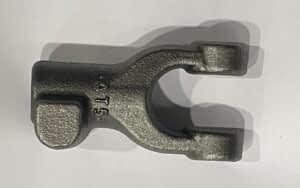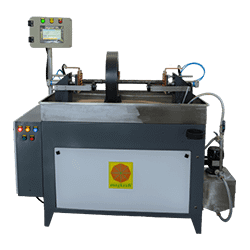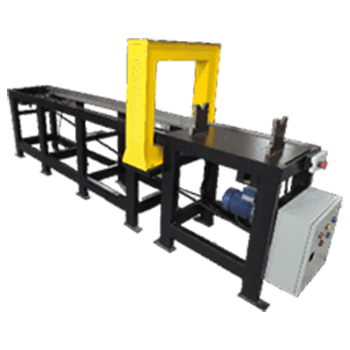Magnetic Particle Inspection of Half Yokes
Half yokes, also referred to as universal joint yokes, play a pivotal role in facilitating torque transmission between different components within a vehicle’s drivetrain, particularly in the context of propeller shafts and drivelines. These yokes provide the necessary flexibility for angular movement while ensuring consistent power delivery. Their significance lies in accommodating variations in suspension travel, engine movement, and the rotation of the differential.
Considering the critical role they play in power transmission and the challenging operational conditions they endure, ensuring the structural integrity of half yokes is paramount. Magnetic Particle Testing (MPT) stands out as a crucial inspection technique for these components. MPT is a non-destructive testing method specifically designed to identify surface and near-surface defects in ferromagnetic materials. By subjecting half yokes to a magnetic field and introducing magnetic particles, potential issues such as cracks, fatigue, or other flaws become visible. This proactive approach to inspection facilitates the early identification of problems, preventing unexpected failures and ultimately enhancing the overall reliability and safety of the vehicle’s drivetrain system.

The half yoke must undergo magnetization in two mutually perpendicular directions. A circular magnetic field is employed to identify longitudinal flaws within the component.
The generation of the circular magnetic field involves passing a current along the length of the semi-yoke.
The determination of the head shot current follows the formula specified in ASTM standards.
Head Shot Current = 20 X Diameter(mm)
In the above formula, the diameter should be taken as diameter of the boss portion.
Longitudinal magnetic field, required for detection of transverse defects is generated by using an encircling coil.
Formula for calculation of coil current
In the above formula, the diameter should be taken as the average diameter of the half yoke. Average diameter can be calculated by the following formula.
The yoke has a unique geometry, starting as a single unit and splitting into two at the other end. If one arm of the half yoke loses contact with the tailstock, current may pass through only one arm, leaving the other unmagnetized. The current distribution is influenced by resistance and contact resistance, making it challenging to ensure equal current flow through each arm, potentially leading to flaws being overlooked.
To address this, a specialized horizontal bench-type machine is employed for magnetic particle testing on half yokes. The machine’s split tailstock, equipped with individual pneumatic cylinders for each part, ensures proper clamping of both arms. To maintain even current distribution, the current passing through each arm is measured and controlled separately. A Poke yoke system alerts to any anomalies in the current distribution between the two arms.
Multi-directional magnetization is a specialized technique used to detect defects in all orientations within a single examination. Unlike the combined magnetization shot used in traditional machines, which deviates from ASTM standards, this approach is effective in identifying both longitudinal and transverse cracks in a single examination. The machine employs multi-directional magnetization to detect defects in all directions simultaneously.
Multidirectional Technique
- Clean and dry the surface of the half yoke before inspection.
- Place the half yoke on the fixture.
- Apply a magnetic solution bath to the half yoke.
- Press the ‘Cycle Start’ button.
- The half yoke is automatically clamped.
- The coil moves to its position.
- Stop the bath flow.
- Now, pass current through the half yoke and the coil in multidirectional mode.
- Read the results on the digital metering unit.
- The half yoke is automatically de-clamped.
- Inspect the half yoke under UV light for all defects.
- Demagnetize.





